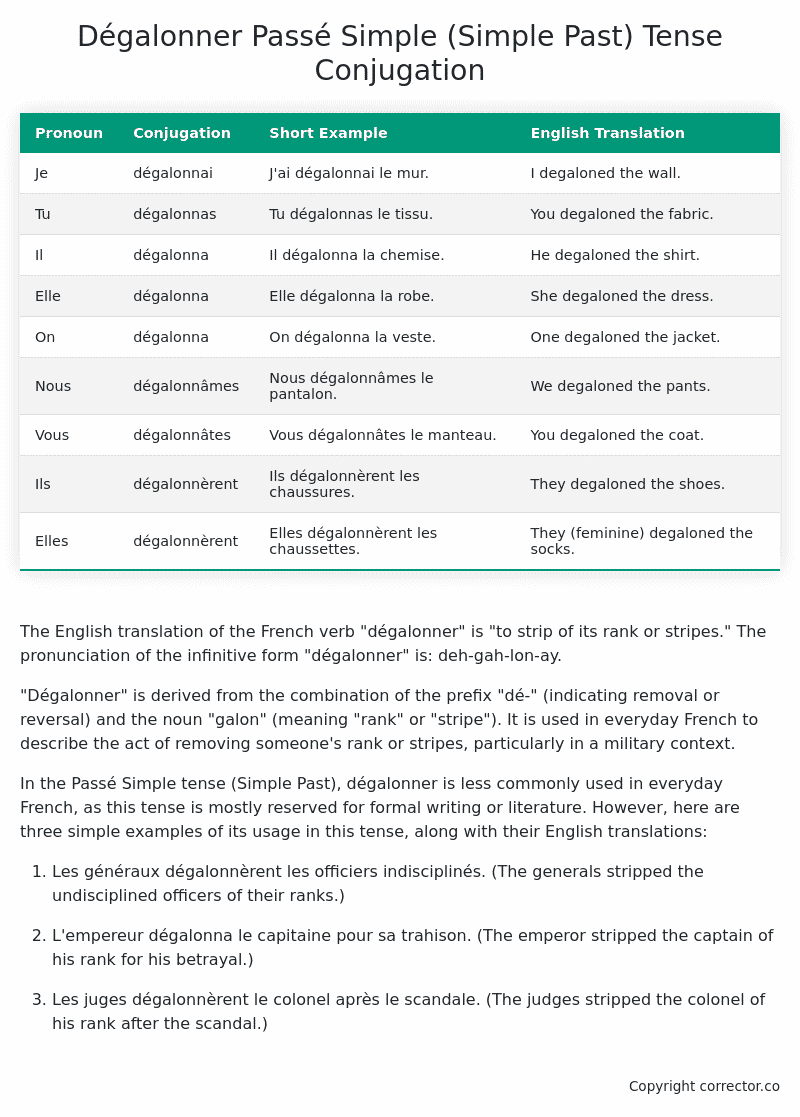Passé Simple (Simple Past) Tense Conjugation of the French Verb dégalonner
Introduction to the verb dégalonner
The English translation of the French verb “dégalonner” is “to strip of its rank or stripes.” The pronunciation of the infinitive form “dégalonner” is: deh-gah-lon-ay.
“Dégalonner” is derived from the combination of the prefix “dé-” (indicating removal or reversal) and the noun “galon” (meaning “rank” or “stripe”). It is used in everyday French to describe the act of removing someone’s rank or stripes, particularly in a military context.
In the Passé Simple tense (Simple Past), dégalonner is less commonly used in everyday French, as this tense is mostly reserved for formal writing or literature. However, here are three simple examples of its usage in this tense, along with their English translations:
-
Les généraux dégalonnèrent les officiers indisciplinés.
(The generals stripped the undisciplined officers of their ranks.) -
L’empereur dégalonna le capitaine pour sa trahison.
(The emperor stripped the captain of his rank for his betrayal.) -
Les juges dégalonnèrent le colonel après le scandale.
(The judges stripped the colonel of his rank after the scandal.)
Table of the Passé Simple (Simple Past) Tense Conjugation of dégalonner
| Pronoun | Conjugation | Short Example | English Translation |
|---|---|---|---|
| Je | dégalonnai | J’ai dégalonnai le mur. | I degaloned the wall. |
| Tu | dégalonnas | Tu dégalonnas le tissu. | You degaloned the fabric. |
| Il | dégalonna | Il dégalonna la chemise. | He degaloned the shirt. |
| Elle | dégalonna | Elle dégalonna la robe. | She degaloned the dress. |
| On | dégalonna | On dégalonna la veste. | One degaloned the jacket. |
| Nous | dégalonnâmes | Nous dégalonnâmes le pantalon. | We degaloned the pants. |
| Vous | dégalonnâtes | Vous dégalonnâtes le manteau. | You degaloned the coat. |
| Ils | dégalonnèrent | Ils dégalonnèrent les chaussures. | They degaloned the shoes. |
| Elles | dégalonnèrent | Elles dégalonnèrent les chaussettes. | They (feminine) degaloned the socks. |
Other Conjugations for Dégalonner.
Le Present (Present Tense) Conjugation of the French Verb dégalonner
Imparfait (Imperfect) Tense Conjugation of the French Verb dégalonner
Passé Simple (Simple Past) Tense Conjugation of the French Verb dégalonner (You’re reading it right now!)
Passé Composé (Present Perfect) Tense Conjugation of the French Verb dégalonner
Futur Simple (Simple Future) Tense Conjugation of the French Verb dégalonner
Futur Proche (Near Future) Tense Conjugation of the French Verb dégalonner
Plus-que-parfait (Pluperfect) Tense Conjugation of the French Verb dégalonner
Passé Antérieur (Past Anterior) Tense Conjugation of the French Verb dégalonner
Futur Antérieur (Future Anterior) Tense Conjugation of the French Verb dégalonner
Subjonctif Présent (Subjunctive Present) Tense Conjugation of the French Verb dégalonner
Subjonctif Passé (Subjunctive Past) Tense Conjugation of the French Verb dégalonner
Subjonctif Imparfait (Subjunctive Imperfect) Tense Conjugation of the French Verb dégalonner
Subjonctif Plus-que-parfait (Subjunctive Pluperfect) Tense Conjugation of the French Verb dégalonner
Conditionnel Présent (Conditional Present) Tense Conjugation of the French Verb dégalonner
Conditionnel Passé (Conditional Past) Tense Conjugation of the French Verb dégalonner
Conditionnel Passé II (Conditional Past II) Tense Conjugation of the French Verb dégalonner
L’impératif Présent (Imperative Present) Tense Conjugation of the French Verb dégalonner
L’impératif Passé (Imperative Past) Tense Conjugation of the French Verb dégalonner
L’infinitif Présent (Infinitive Present) Tense Conjugation of the French Verb dégalonner
L’infinitif Passé (Infinitive Past) Tense Conjugation of the French Verb dégalonner
Le Participe Présent (Present Participle) Tense Conjugation of the French Verb dégalonner
Le Participe Passé (Past Participle) Tense Conjugation of the French Verb dégalonner
Struggling with French verbs or the language in general? Why not use our free French Grammar Checker – no registration required!
Get a FREE Download Study Sheet of this Conjugation 🔥
Simply right click the image below, click “save image” and get your free reference for the dégalonner Passé Simple tense conjugation!

Dégalonner – About the French Passé Simple (Simple Past) Tense
Formation
Usage
Narration
Historical Context
Interactions with other tenses
Passé Composé
Imparfait
Conditional and Subjunctive
Summary
I hope you enjoyed this article on the verb dégalonner. Still in a learning mood? Check out another TOTALLY random French verb conjugation!


